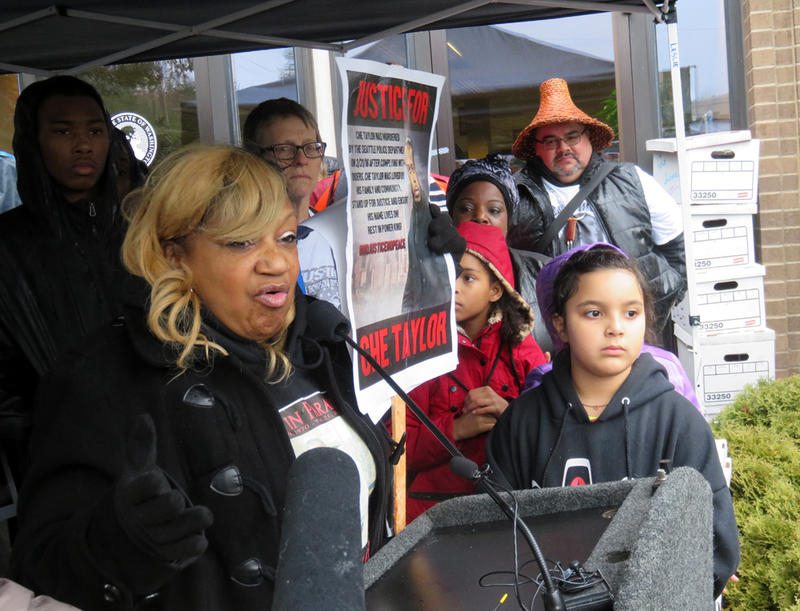
Initiative 940: Washington Voters Will Likely Get To Weigh In On Police Deadly Force
Listen
Washington voters will likely get to weigh in on police use of deadly force. A ballot measure on that subject turned in around 360,000 voter signatures Thursday afternoon. That should be more than enough to qualify for consideration by the Washington Legislature and then probably go to the statewide ballot in 2018.
Washington currently has one of the highest thresholds in the nation for criminally charging police officers who use deadly force. They are protected as long as they act in “good faith” and without malice. In recent history, county prosecutors in Washington who reviewed controversial police shootings invariably declined to charge any of the officers involved.
Initiative 940 would allow prosecutors to charge a police officer after a deadly shooting using a new “good faith” standard and it calls for ongoing de-escalation and mental health training for officers.
Relatives of people who died in confrontations with police marched triumphantly through the rain to the beat of tribal drums to deliver boxes of petition signatures to the Washington Secretary of State’s office.
Katrina Johnson’s cousin Charleena Lyles was shot by Seattle Police last June.
“The state of Washington has spoken. Enough is enough,” Johnson said. “There is enough blood that has been spilled on these streets and it stops today. We got 360,000 signatures so our loved one’s death will not be in vain,” she said to cheers.
Police officers guilds strongly oppose this initiative. They argue it would change Washington’s standard for prosecution of officers from one of the most protective in the country to one that is highly subjective and “least protective.”
“We feel strongly that changing the Use of Force Law will not reduce violent interactions between law enforcement and the public,” Washington Council of Police and Sheriffs President Craig Bulkley wrote in a public letter. “In fact, it could cause more violence as it ties the hands of police officers, troopers and deputies, and could cost lives.”
“I-940 is bad for communities. It is NOT about training, it’s only intent is to put officers in JAIL,” the Seattle Police Officer’s Guild tweeted earlier this month.
Sisters Uyen Le and Xuyen Le, whose nephew Tommy Le was shot and killed by a King County sheriff’s deputy in June, argued that current policing and accountability policies cannot be allowed to continue.
“Had there been this Initiative 940—de-escalation tactics, the standards for use of deadly force, mental health and first aid training—many innocent lives would have been spared,” Uyen Le said at the signature delivery march.
Because the I-940 campaign turned in well over the minimum 260,000 voter signatures required to qualify a statewide initiative, the Secretary of State’s office can do a random sample check of the signatures. That could take up to a month to complete.
After an initiative to the legislature is certified, elected lawmakers have three options. They can vote to adopt the initiative as proposed and it becomes law without further ado. Lawmakers can also draw up an alternative measure and then both the citizen initiative and the legislature’s alternative go to the voters at the next general election. Or the legislature can reject the initiative or do nothing, in which case the measure automatically goes onto the November statewide ballot.
Washington state lawmakers rarely pass initiatives to the Legislature into law themselves or present alternatives. Legislators punted to the voters on the past 13 initiatives that came before them dating back to 1995.
Leaders of De-Escalate Washington, the campaign organization for I-940, would like for their initiative to be approved during the 2018 legislative session, but realistically expect to be punted to the November ballot.
De-Escalate Washington drew some high-profile backers who made five- and six-figure donations so the campaign could hire paid signature gatherers. Major donors included the Puyallup, Muckleshoot and Tulalip tribes, SEIU and UFCW labor union locals and Seattle venture capitalist Nick Hanauer.
I-940 was one of 70 initiatives to the legislature filed with the Washington Secretary of State this year. The other proposed measures covered a multitude of different subjects from marijuana regulation and health care to car tab fees and term limits for local government officials.
State Elections Division staff do not expect any other campaigns to turn in petitions before Friday’s deadline.
Related Stories:

Seattle Veterans Affairs staffer alleges whistleblower retaliation
A staffer for the Veterans Affairs Puget Sound Health Care System has alleged retaliation after he spoke out about the deteriorating conditions of a building on the south Seattle campus that housed specialty clinics and office space.
Douglas Galuszka, chief of logistics, was issued two suspensions totaling three weeks of unpaid leave this year. He said VA administrators punished him for calling attention to leadership failures at the hospital and talking with press. According to Galuszka, the two suspensions he served mark the only discipline he has received in his seven years working for the VA. Prior to the suspensions, Galuszka said, he was not counseled by a supervisor or required to go through training.

What is Initiative 2109?
Listen I-2109 would repeal the capital gains tax, which helps fund child care and schools. (Credit: Flickr Creative Commons / Kids’ Work Chicago Daycare) (Runtime :56) Read In NWPB’s recent

What is Initiative 2124?
A resident makes his way to the dining room for lunch at a nursing home on March 6, 2020. (Credit: David Goldman / AP Photo) Listen (Runtime :53) Read In












